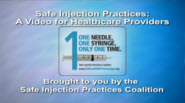Information for Providers

Recent investigations undertaken by state and
local health departments and the Centers for Disease
Control and Prevention (CDC) have identified
improper use of syringes, needles, and medication
vials during routine healthcare procedures, such as
administering injections. These practices have
resulted in one or more of the following:
- Transmission of bloodborne viruses,
including hepatitis C virus to patients
- Notification of thousands of patients of
possible exposure to bloodborne pathogens and
recommendation that they be tested for HCV, HBV,
and HIV
- Referral of providers to licensing boards
for disciplinary action
- Malpractice suits filed by patients
These unfortunate events serve as a reminder of
the serious consequences of failure to maintain
strict adherence to safe injection practices during
patient care. Injection safety and other basic
infection control practices are central to patient
safety. All healthcare providers are urged to
carefully review their infection control practices
and the practices of all staff under their
supervision. In particular, providers should ensure
that staff:
- Never administer medications from the
same syringe to more than one patient, even if
the needle is changed
- Do not enter a vial with a used syringe
or needle
Hepatitis C virus, hepatitis B virus, and HIV can
be spread from patient to patient when these simple
precautions are not followed. Additional protection
is offered when medication vials can be dedicated to
a single patient. It is important that:
- Medications packaged as single-use vials
never be used for more than one patient
- Medications packaged as multi-use vials be
assigned to a single patient whenever possible
- Bags or bottles of intravenous solution not
be used as a common source of supply for more
than one patient
- Absolute adherence to proper infection
control practices be maintained during the
preparation and administration of injected
medications
Continuing Education Activity (CME/CNE/CEU)
Slide Presentations
COCA Conference Call Ė A ďNeverĒ Event:
Unsafe Injection Practices (March 27, 2008)
Injection Safety FAQs for Providers
One & Only Campaign
Visit the One & Only Campaign page.
Video

The
Safe Injection Practices video
for healthcare providers is designed to
remind healthcare providers to
consistently utilize basic,
evidence-based, common sense precautions
to protect patients and themselves
Posters
Additional Materials